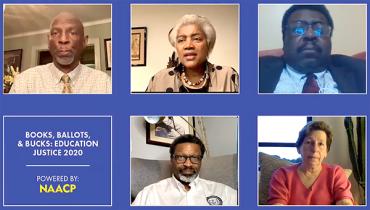This month, civil rights advocates expected to celebrate the anniversary of Brown v. Board of Education, the landmark Supreme Court decision that integrated public schools. Instead, they are facing stark, historic inequities laid bare by a global pandemic. At a May 28 panel discussion hosted by the NAACP, five leading activists, including AFT President Randi Weingarten, confronted the fact that communities of color have been hit much harder than others by the coronavirus crisis and its economic impact. The panelists discussed the intersection of “books, ballots and bucks”—that is, public education, voting and funding for the neediest students and their families during this unprecedented time.
“What COVID-19 has done is it has exposed every single inequity in our country,” said Weingarten.
“This crisis has amplified existing racial disparities,” agreed Donna Brazile, endowed chair of the King Lecture series at Howard University and former interim chair of the Democratic National Committee, who moderated the panel. Those disparities were years in the making—the result of “systemic public policy neglect in our communities,” said Derrick Johnson, president and CEO of the NAACP. This NAACP survey shows how COVID-19 has affected the African American community.
Refusing to expand the Affordable Care Act and ignoring the income gap are just part of a legacy of failure that the NAACP has fought since its inception, said Johnson. Access to healthcare in communities of color is sorely lacking, education is subpar, and the country is failing to meet the three measures Johnson outlines as necessary for a healthy society: caring for our elderly, preparing young people for a productive future, and protecting the rights of the disadvantaged.
Books: A state of emergency
“African Americans are facing one of the largest education crises in my whole professional career,” said Geoffrey Canada, president of Harlem Children’s Zone, a network of public charter schools and educational support services. “I’ve been at this more than 50 years, and I’ve never seen anything like this. We have kids who don’t have [internet] devices who were let out of school three months early. These kids are going to flounder, if we don’t treat this as an emergency. … These kids were already hanging on by their fingernails when it comes to their education.”
“The significance of what’s happening today cannot be overstated,” agreed John Pierre, dean of the Southern University Law Center, a historically black university in Louisiana. While he has faith in the resilience of students and leaders at historically black colleges and universities, the impact of historic neglect will be difficult to overcome. “There are going to be challenges coming up in the fall because we are victims of a long line of underfunding,” he said, noting that even college students are struggling with a lack of connectivity.
Having a tablet, laptop or desktop and being connected to the internet today is the equivalent of having books, said Canada. “You can’t have one device for a family of four kids. We should make sure that every single child in America has internet access.”
Bucks: Prioritize education funding
Funding that access is crucial, Canada added, but he worries that states are going to cut back on education spending. “This is the worst possible thing this country can do. We need to be bringing more money into education. Cutting education right now is essentially saying these are throwaway kids and we don’t care about them.”
Weingarten agreed, and said the AFT is pressing hard for the Senate to pass the HEROES Act, which would provide funding for public schools to reopen safely and equitably. Weingarten called the HEROES Act a “No. 1 priority,” and described the AFT’s email and phone campaign to urge senators to pass it.
“To the extent that we can open schools safely, we need to do that,” she said. “We need kids to see each other. We need to have connectivity, and we need to demand that of the cable companies. You can’t have remote education and have a cable company say because a parent didn’t pay a bill two years ago they will no longer get access to connectivity.”
Weingarten also suggested using summer school as a dry run for opening in the fall, building up community schooling with wraparound services, opening school kitchens to be sure families are fed throughout the summer, and using book distributions and community readings to encourage reading.
Ballots: Ensure fair voting
The panel also discussed the relationship between funding public education and fair elections. “There’s no disconnection between ballots and books,” said Johnson, since voting pro-public education policymakers into office could lift up schools and families. “We must have equal access to polling places,” he said, with basics like a minimum number of voting machines required at each precinct, the ability to vote at any county precinct, and PPE for every poll worker, which are essential in making voter access equitable.
Weingarten sees a way forward with the HEROES Act and with continued activism and meaningful elections. “With the alliances that we have here where we work together, where we act together, where we show up together—whether it is in the Congress, in an election, in community schools, on the streets, in statehouses—whatever we do, we must join together to make a better nation,” she said.
To help pass the HEROES Act, take action and write to Congress.
[Virginia Myers]

